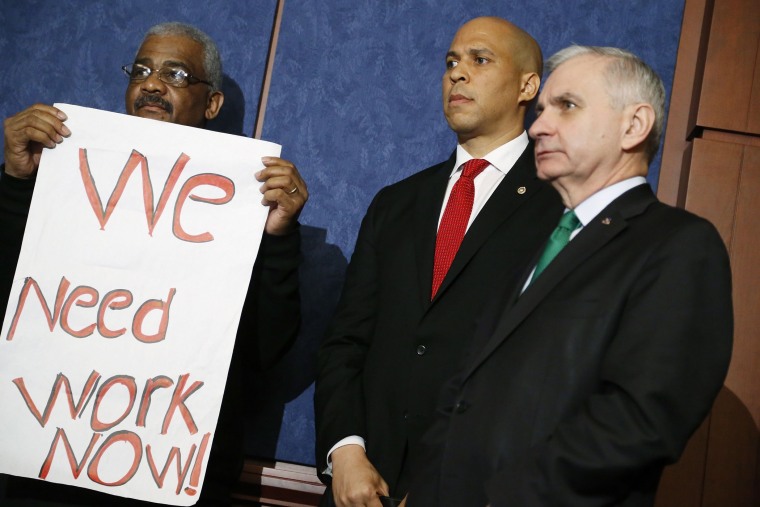Just two weeks ago, a bipartisan group of senator announced last week they'd finally reached a deal on extending unemployment benefits. Sen. Jack Reed (D-R.I.), one of the lead negotiators, called it a "
bipartisan breakthrough."
There were a few bumps in the road between then and now, but today it
took an important step towards becoming law.
The Senate easily cleared a 60-vote threshold Thursday to advance a bipartisan extension of emergency unemployment insurance benefits. With backing from Republicans, the Senate voted 65-34 to end a filibuster against bringing the bill up for debate. It'll still face the likelihood of another filibuster before final passage, expected next week. Asked before the vote whether the bill would get more than just the five Republicans needed, Sen. Jack Reed, D-R.I., who helped negotiate the package said, "I don't know, [but] I hope so."
Reed's hopes paid off -- the vote to break the Republican filibuster was
65 to 34. While all 34 opponents were, as expected, GOP senators, 10 Republicans nevertheless joined with the Democratic majority to advance the bill.
To clarify, this was not a vote on final passage; this was a vote to end GOP obstructionism. In the last several efforts to extend jobless aid, these filibusters prevailed, but today, the bill easily met the 60-vote threshold. It means the bill will get an up-or-down vote, which will be a pretty easy lift.
So, what's left? A bipartisan Senate majority now supports extended jobless benefits that will create hundreds of thousands of jobs while helping millions of struggling Americans keep their heads above water. President Obama is eager to sign it into law and polls show broad public support for the idea.
All that's needed now is support from the Republican-led House of Representatives -- which will be a problem.
House Speaker John Boehner (R-Ohio) fielded a reporter's question on this yesterday and made it sound as if he has no use for the Senate's bipartisan UI bill.
"I made clear that if we were going to consider extending emergency unemployment -- let's all be clear here, we're not talking about regular unemployment insurance, which will go up to six months for anyone who's unemployed. These are benefits beyond six months. But I made clear that if we're going to consider dealing with unemployment -- emergency unemployment -- we ought to do something about creating better jobs in America, higher wages in America. The Senate is sitting on dozens of bills that we've sent over there. So I think it's a time for the Senate to work with the House to help get the economy moving again. That's the real issue."
It's important to understand that much of the Speaker's rhetoric is plainly mistaken. First, if the goal is job creation, the non-partisan Congressional Budget Office has already told Congress that failing to extend unemployment benefits will cost the U.S. economy about 200,000 jobs this year alone.
Second, when Boehner says the Senate is "sitting on" jobs bills approved by the House, those bills
aren't actually meaningful efforts at job creation. It's one of the reasons the Speaker routinely talks about the "dozens of bills" without actually going into any details -- what he calls a "jobs bill" isn't actually a jobs bill.
Third, if Boehner were serious about working with Democrats on economic growth, he'd stop pushing spending cuts that take capital out of the economy and create a drag on job creation, and start considering some credible, bipartisan proposals. For the last three years, he hasn't been willing to do any of this.
Indeed, every time Boehner comes up with an excuse to reject extended jobless aid, it seems to
fall apart under scrutiny, but that doesn't stop him from coming up with new excuses.
Given the larger circumstances, this may seem politically untenable. House Republicans, all of whom will face re-election in 222 days, are prepared to ignore a popular, bipartisan economic bill that would create hundreds of thousands of jobs? Leaving 2 million unemployed Americans with nothing? The answer, of course, is yes -- the House GOP seems to think between gerrymandering, low Democratic turnout, and attack ads from billionaires, they can pretty much act with impunity.
And they're probably right.
